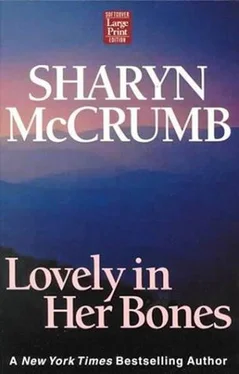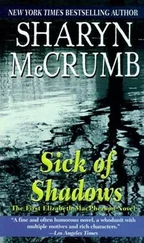“So?”
“Yesterday she came back to get her guitar. Makes me wonder why she left it in the first place.”
“Check up on her, too,” sighed the agent. “You’re lucky we don’t charge you locals for computer time.”
Pilot felt the discomfort of obligation. “I’m mighty grateful to you for helping me out like this,” he said awkwardly.
“No problem, Deputy. You sure are putting in a lot of overtime on this case. Personal interest?”
Pilot shook his head. “I just want to clear it up before the sheriff gets back.” To show him what I can do without supervision, he finished silently. He can’t stay sheriff forever; maybe there is a promotion in this. He didn’t think it was going to happen, though. Pilot Barnes couldn’t shake the feeling that he was missing some vital thread of the investigation, something that he might not even recognize if it were put before him. Duncan Johnson, he told himself, would have caught it in a minute. Pilot Barnes stared morosely at the Wise Woman of the Woods sign; it didn’t take a prophet to tell him he didn’t have a hope in hell of becoming sheriff.
Tessa Lerche, forewarned that the inquest would take place in an un-air-conditioned courtroom, did not wear black. In her beige linen suit, matching bone shoes, and touches of gold jewelry at the ears and throat, she seemed a cool and neutral observer to the proceedings inquiring into her husband’s death. In fact, she would not wear black at all except to the funeral; it seemed hypocritical in one who had lately been studying pamphlets on community property in divorce, and Tessa loathed the semblance of hyprocrisy. She gave her evidence of accompanying Milo to the site on the night of the murder, speaking in a clear, calm voice softened by sorrow. She had used such a voice once in a college production of Riders to the Sea , in the old woman’s speech: “They’re all gone now, and there’s nothing more the sea can do to me…” Traces of a brogue crept into her testimony, causing the more astute listeners to suppose her Irish by birth.
Stepping down from the witness stand, she took her seat beside Milo and listened to the medical evidence with the blank face of one whose thoughts were elsewhere. Once, at some particularly graphic phrase uttered by the coroner, Milo glanced at her, but she looked up at him with a half-smile and continued to study the placement of her neat little hands, clutching the calfskin purse in her lap.
When the verdict “murder by person or persons unknown” had been delivered, he escorted her outside, protectively watching for reporters with cameras, but none appeared. (Stuart Morton, editor of the Recorder , was off covering the 4-H camp. He would give the inquest the customary six lines on page three.)
“Thank you for seeing me through this,” said Tessa softly. “It meant a lot.”
Milo shifted nervously. “Are you driving back now?”
She looked up at him with moist eyes. “Will you think it terrible of me if I tell you I’d like to have lunch first? I guess I should get used to eating alone, but…” She trailed off, a quaver in her voice.
“Of course,” said Milo, wondering how she had managed to make him feel guilty. “Where would you like to go?”
Tessa sighed. “It doesn’t matter. I never notice what I eat any more. Only I couldn’t bear to be on public display in some local café.” She shuddered delicately.
After some discussion it was decided that the Rhododendron Inn, an Edwardian mansion outfitted as a tavern, would suit Tessa’s sense of propriety. Milo, checking his hip pocket for his credit card, agreed without noticeable enthusiasm. The Rhododendron Inn, half-timbered and decorated with farm implements on the walls, fancied itself the sort of place where George Washington might have dined, had he been willing to mortgage Mount Vernon to pay for the meal.
When they had been seated at a small pine table with a mason jar of wildflowers between them, Tessa whispered, “I hope they don’t serve that greasy country food!”
Milo, who hoped they did, said, “Why don’t you order a salad?”
Milo opted for the country buffet, leaving Tessa to quiche du jour and pumpkin muffins. He stayed in the buffet line longer than he might have had he been anxious to return to his table partner. He wondered if Tessa merely wanted to rehash the inquest or if she had something else in mind.
“How do you think it went?” she asked him, trying not to look at the steaming plate of pinto beans and fried apples.
“The inquest? Pretty routine, I guess.”
“I can’t help feeling that the police have someone in mind as a suspect, but that they don’t want to show their hand yet.”
“I doubt it,” said Milo between mouthfuls. “Since there has been another murder, I expect they’d arrest somebody if they could.”
“Poor… Victor,” Tessa responded, trying to remember if she’d met him. “I suppose he must have seen something?”
“I don’t know. Even if he did, it’s hard to imagine any of us believing him. Victor was such a liar he’d have said anything. We all ignored him.”
She shook her head reprovingly, as if to remind him not to speak ill of the dead. “Still, he will be missed. Have you told his family yet?”
“I called them this morning,” said Milo sharply, unwilling to discuss it further. Victor’s mother had succumbed to hysterics as if on cue, but his father had been gravely calm. He seemed to regard the episode as Victor’s most ambitious bid for attention.
“Even the most inconsiderate, self-centered people are mourned by those who loved them,” sighed Tessa. She managed to imply that this was the case with Alex.
When Milo, in what she supposed to be an excess of sympathy for her past and present suffering, did not reply to this, Tessa tried again: “I suppose you’ll be coming back to town soon?”
“Probably tomorrow. Depends on what arrangements are being made about Victor.”
Tessa had a sudden image of Milo conveying Victor’s body home to Maryland in a station wagon; she was sure that this was not what he meant, but since she wasn’t interested in the details anyway, she let it pass. “You will come and see me when you get back, won’t you?”
“Of course. I thought you’d want me to take charge of Alex’s papers.”
“That, too,” murmured Tessa.
Milo raised his head, like one who has just heard ticking from the luggage rack above him. “Too?”
“Oh, Milo, there are just so many things to cope with now that Alex is gone! You know, taxes, and the will…”
“Didn’t he have a lawyer?”
“Yes, but… And I have to dispose of his clothes.”
“Goodwill box, corner of Elm and Sycamore.”
“You don’t understand,” said Tessa in an exasperated voice. “I just can’t seem to cope with this… this…”
“I believe the Crisis Center has a seminar on coping with bereavement,” said Milo evenly. “I’m sure they could help you more than I.”
She pursed her lips. “I’m sure I’ll feel much better when they’ve arrested that cat-faced little colleague of yours! She meant to get Alex one way or another, and the police know it, too!”
A diffident figure in khaki approached their table. Milo was never so glad to see anyone in his life. Bewildered at the effusiveness of the greeting, Dummyweed blinked at them, surprised that the fellow who had always been curt with him should have taken such a liking to him now. Perhaps it was the new uniform; one of Pilot’s, actually, but it fit well enough.
“I saw your car outside,” he told them. “Mr. Barnes wants me to go back to Sarvice Valley on guard duty.”
Under any other circumstances, Milo would have told him to get lost, but now that he presented an alternative to prolonging the interview with Tessa, Milo was the soul of cooperation. “Of course!” he said, getting up. “Do you need me to come with you? Does Barnes need to see me?”
Читать дальше












